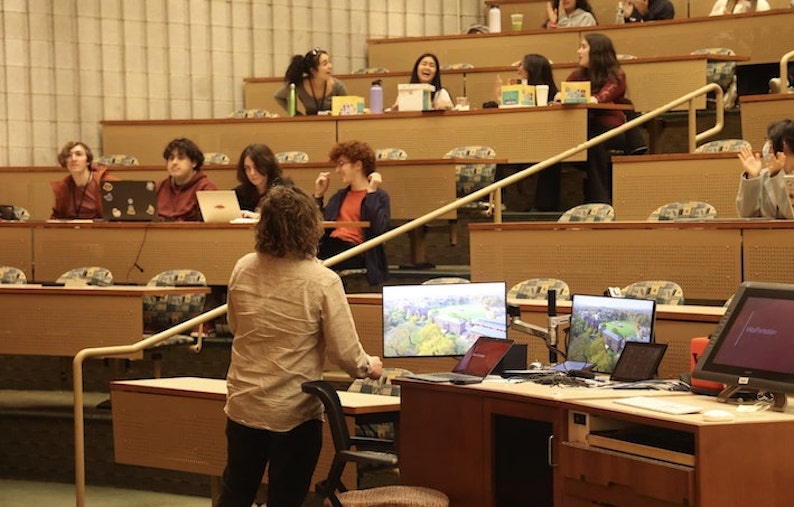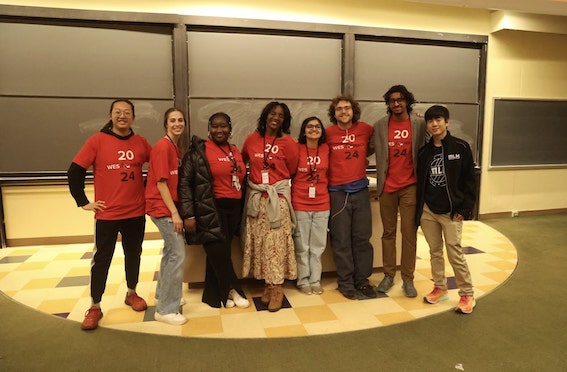
Wesleyan’s computer science club, Code_Wes, hosted 85 undergraduate students from around the country to participate in a 24-hour hackathon event called “WesHack” on the weekend of Nov. 16. Students worked overnight to develop innovative software and hardware solutions, competing for prizes that included paid summer internships, keyboards, drones, cameras, and more.
“WesHack is a weekend-long hackathon calling coders, hackers, artists, designers, tech evangelists, and developers to collaborate and build innovative technologies,” the WesHack Vercel platform read. “Throughout the weekend, participants will have the opportunity to attend workshops and speeches from industry experts. Meals, swag, and more will be provided throughout, and valuable prizes will be awarded to top performing submissions.”
Organized by Code_Wes President Anan Afrida ’26, Event Coordinators Yenta Bick ’26 and Nishant Aggarwal ’26, Student Outreach Liaison Chi Phan ’25, and Social Media Manager Ray Huang ’26, the event granted students opportunities to participate in friendly competition and attend workshops with industry professionals, including University alumni.
The event was co-hosted by the Patricelli Center for Social Entrepreneurship, and sponsored by Wesleyan’s Mathematics and Computer Science Department. External sponsors included established companies and startups such as LeoLabs, O’Reilly, WolframAlpha, OurCampus, Major League Hacking, and ActualFood. The event was free of charge for all participants and open to students of all skill levels.
Students arrived for check-in at 9 a.m. on Saturday, Nov. 16, and immediately began team formation in Exley Science Center room 189. Teams were arranged in groups of four, and members were tasked with developing projects that fell under categories including education, health, entertainment, and sustainability. Check-in was followed by an opening ceremony in Tischler Hall, and students began coding at 11 a.m.
Fifteen of the participating students were from Wesleyan, and other students traveled to campus from a variety of institutions—including other liberal arts colleges such as Bard College, Vassar College, Trinity College, and Barnard College; research universities such as Boston University, Central Connecticut State University, Northeastern University, Eastern Connecticut State University, University of Connecticut, University of New Haven; and community colleges such as Monroe Community College.
“Ever since I came to Wesleyan, I’ve envisioned creating a tech space where enthusiasts can collaborate, innovate, and inspire one another,” Afrida wrote in an email to The Argus. “I am thrilled that a total of 15 universities participated, which invited cross-collaboration.”
The first industry workshop was hosted by ActualFood CEO Greg Grinberg on DevOps. ActualFood is a philanthropically funded research and development laboratory looking to change the grocery store shopping experience by increasing access to fresh food through a free, same-day delivery system, available to rural, suburban, and urban communities alike. A Major League Hacking GitHub workshop followed, and students were invited to participate in an informal “Fireside Chat” with WesHack judges.
Grinberg was only one of the panelists featured during WesHack 2024. Other judges included Google Senior Software Engineer Caroline Liu ’18, Slack Software Engineer II Daniel Knopf ’22, GAF Engineer Daniel Goldelman ’23 MA ’24, Gavin Horning-Kane ’24, and Uber Software Engineer II Mihika Aggarwal.
Students remained in Exley overnight to work on their projects. They were provided with plenty of pizza and snacks to stay energized.
“The organizing team was phenomenal: people were walking around and checking in on groups and running little side events all day long, and even past midnight [they] would just walk over and chat for a bit,” Zameen Cater ’28 wrote in an email to The Argus.

On Sunday, the completed hackathon projects were presented to the judges. Prizes included the Best Beginner Prize for the best project built by a team consisting of all beginner participants, the Best Women’s Hacking prize for the best hackathon project built by a team consisting of all non-male participants, and an internship prize track with ActualFood.
Two Wesleyan teams won the internship prize track, which granted them fully funded summer internships at ActualFood, headquartered in Hartford, Conn. The first-place team, with their project “Wesportation” included members Francisca Wijaya ’27, Tara Pandey ’27, Alena Chen ’27, and Brynne Barnard-Bahn ’27. Wesportation also received the second-place spot for the Best Women’s Hacking Team.
Wesportation is a web app designed to mediate transportation problems for Wesleyan students without cars. Students without transportation typically resort to Uber ride-shares or walking long distances, which can pose financial, environmental, and safety issues. The app that the team designed would allow Wesleyan users to connect and carpool to events and destinations.
Wijaya, Pandey, Chen, and Barnard-Bahn worked on both the back-end and the front-end to build the app from scratch, using Google Calendar, OAuth 2.0, and the OpenCage Geocoding APIs, as well as HTML with JavaScript, and PHP and SML. Some members were unfamiliar with some of these languages and pieces of software at the start, but learned them within the 24-hour competition period.
The second-place team created “eQoScan,” and members were Yehor Mishchyriak ’26, Jeremy Zay ’26, Ambrose Vannier ’26, and Samvit Singhal ’27. The students created a mobile and web app designed to streamline the process of scanning reusable Eco2Go food containers in and out at Wesleyan. These food containers, accessible to students at Usdan Marketplace and Summerfields, have seen management issues in the past; eQoScan would ease the implementation of the program for both the University and its students.
“Our system also reduces fraud greatly by making students sign in with Google, preventing workarounds with the current system where students can make multiple accounts,” Vannier wrote in an email to The Argus. “We also implemented a dynamically generating QR code web portal (that dining halls can log into) that stops students from ‘checking out’ containers from within their room.”
WesHack was the University’s first in-person hackathon, and 40% of its attendants were non-male. The two specialized prizes for non-male teams and on-the-spot internship offers for non-male students were also unique to WesHack. Afrida hopes these opportunities will encourage higher non-male participation in computer science at Wesleyan.
“WesHack had two prize tracks, specifically for women, one of which I funded,” Afrida wrote. “So hopefully, WesHack encouraged more non-male identifying students to attend hackathons and contribute to the future of building apps.”
Overall, students had both an educational and enjoyable 24 hours, and were proud to be a part of such a successful program.
“I was very happy to take part in the hackathon for the teamwork and development experience I gained from it,” Mishchyriak wrote in an email to The Argus. “That said, it’s not only the process itself that I found valuable, but the final outcome too!”
Carolyn Neugarten can be reached at cneugarten@wesleyan.edu.


Leave a Reply